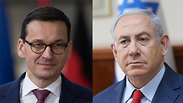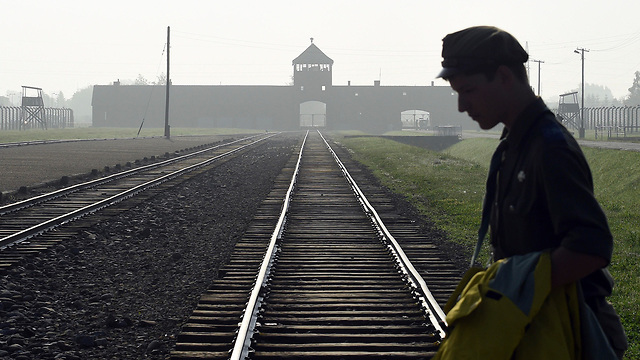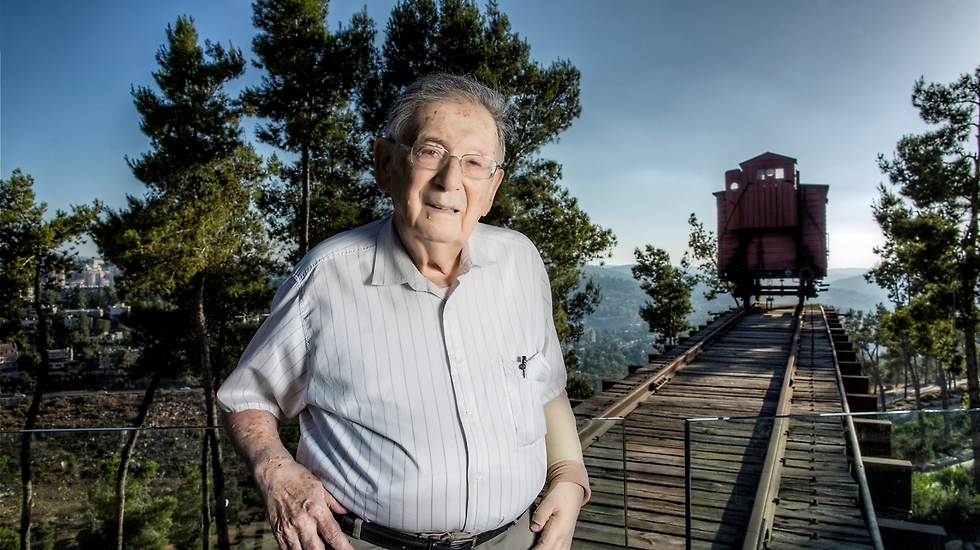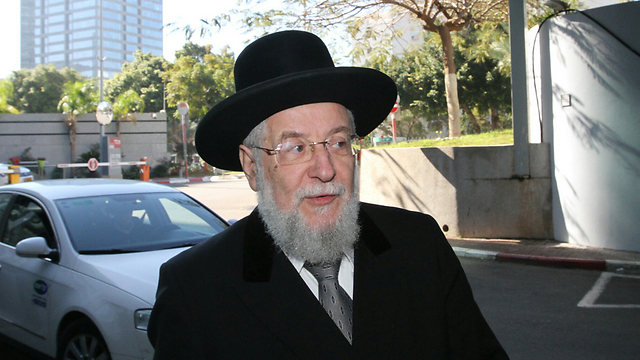
Holocaust survivors feel betrayed by Polish-Israeli statement
'The truth cannot be denied, and we can't be forced not to tell the truth,' says one Holocaust survivor in protest of the agreement Israel and Poland reached; 'When I heard about this on the radio, I thought I wasn't hearing well. How can this be?' says another survivor.
Many Holocaust survivors felt betrayed by joint statement released by Prime Minister Benjamin Netanyahu and Polish Prime Minister Mateusz Morawiecki aimed at ending a dispute over Holocaust legislation in Poland.
Yad Vashem, the Holocaust Memorial Museum, criticized the statement, which was published in newspapers in Israel and abroad on Thursday, as historically inaccurate, challenging in particular the validity of the leaders' assertion that the Polish underground and government-in-exile in World War Two came to the aid of Jews facing death at the hands of the Nazis.
Many Holocaust survivors said the State of Israel should not have reached an agreement with Poland over the European nation's controversial Holocaust law.

Michael Rosenthal, a Holocaust survivor from Ukraine, dubbed the statement "a betrayal of the Jewish people, the Jews of Poland and the Jews from all over Europe who were murdered in the Holocaust."
"This agreement is bad and the State of Israel should not have cooperated with it. The truth cannot be denied, and we can't be forced not to tell the truth. There were Poles who turned in Jews, that is a fact," he told Ynet.
While Rosenthal allowed that not all Poles turned in Jews, "they were some who saved Jews—a Polish woman saved my aunt and her daughter," he argued that "Poland has anti-Semitism to this very day."
Lutza Mardler, 85, a Holocaust survivor whose family escaped Poland to Romania after anti-Semitism had spread there before World War II, said that "When I heard about this on the radio, I thought I wasn't hearing well. How can this be? How can the prime minister sign (such) an agreement with Poland?"
"After everything that happened and everything we've been through in World War II with the Poles, which was very bad, now we're making an agreement with them? It's unbelievable. Jews suffered there, in all of the roundups, they all died there," she continued.
"I get chills just from talking about it, just from remembering what happened and what I heard. No one gives us Holocaust survivors respect anymore," she lamented.
Some survivors prefer to see the glass-half-full. Abigail Ben-Nun, an 80-year-old Holocaust survivor who was born in Belgium and survived along with her parents and sisters, argued that "the historical facts are in fact true—the Polish government didn't make any active moves, the people themselves were the murderers. They cooperated with the Germans, while the government as a government did not."
"A Polish parliament member even went into the camps and reported what was happening there during the Holocaust," Ben-Nun continued. "The hatred is towards the Polish people—except for those who were Righteous Among the Nations—and not towards the government. This is different to what happened in countries like Belgium or Hungary, where the governments cooperated with the Nazi regime."
"Overall, I think this agreement is positive, despite the great pain that resurfaces every time the topic comes up. It's always painful," she concluded.
Last week, Poland's ruling conservatives watered down the proposed law, which had drawn Israeli and US condemnation, and removed the threat of jail terms for anyone suggesting the nation was complicit in Nazi crimes against the Jews.
During the war, Jews from across Europe were sent to death camps built and operated by Germans in Nazi-occupied Poland—home to the continent's biggest Jewish community at the time—including Auschwitz, Treblinka, Belzec and Sobibor.
Yad Vashem criticizes 'grave errors and deceptions'
After the law was amended, Prime Minister Netanyahu and his Polish counterpart Morawiecki said in a statement that their countries were "friends and partners" and rejected blaming Poland or its citizens for atrocities committed by the Nazis or collaborators in other countries.
Their statement went on to praise the wartime Polish government-in-exile, saying it tried to "raise awareness among Western allies of the systematic murder" of Polish Jews.
Netanyahu and Morawiecki also acknowledged "the fact that structures of the Polish underground state supervised by the Polish government-in-exile created a mechanism of systematic help and support to Jewish people."
But Yad Vashem said its own "thorough review" showed "that the historical assertions—presented as unchallenged facts—in the joint statement contain grave errors and deceptions."
"The Polish government-in-exile, based in London ... did not work decisively during the war on behalf of Poland's Jewish citizens," Yad Vashem said.
"Much of the Polish resistance in its various movements not only failed to help Jews, but was also not infrequently actively involved in persecuting them," it said.
While Yad Vashem harshly criticized the statement, one of its senior historians, Prof. Dina Porat, took part in the committee that reached the agreement with the Polish government to soften the controversial legislation.
Prof. Yehuda Bauer, one of Israel's top Holocaust scholars, said that despite knowing Prof. Porat well, "she didn't turn to me or talked to me about the topic, so I can't speak to her motives."
"The historical facts in this document are completely distorted, so those who signed it must take responsibility for it," he noted.
Prof. Bauer went on to say that "this declaration provides a stamp of approval to harming the freedom of expression and the freedom of research. Any Polish bureaucrat who learns, for example, that Jews were robbed in his town during the Holocaust, will not be able to expose the truth, and if he does, he would have to pay a fine."
The ramification of the agreement with Poland, he said, would be that "if in the future we turn to American and European officials and complain about something the Polish people did during the Holocaust, they'd tell us: What do you want? Your government signed this document."
Poland stood firm on the joint statement.
"For us, the position expressed by the Prime Minister of Israel Benjamin Netanyahu is binding," Deputy Foreign Minister Bartosz Cichocki told the Polish state news agency PAP.
The debate around the statement confirms the need to "strengthen further cooperation of Polish, Israeli, and Jewish historians, teachers, and museum guides to protect the truth about World War Two and the Holocaust, including between teams created by both prime ministers," he said.
Poles' behaviour during the war has become a central theme for the ruling Law and Justice party, which argues that previous liberal governments in Warsaw tried to teach young people to be ashamed, not proud, of their history.
Thousands of Poles risked their lives to protect Jewish neighbors. But research published since the fall of communism in 1989 showed that thousands also killed Jews or denounced those who hid them to the Nazi occupiers, challenging the national narrative that Poland was solely a victim.
'Two perspectives that can't always be reconciled'
The chairman of the Yad Vashem Council, Rabbi Israel Meir Lau, told Ynet he understood where Netanyahu was coming from that that he believed the prime minister's intentions were good. He also pointed to criticism from Holocaust survivors after Israel established diplomatic ties with Germany.
"There are two perspectives here that can't always be reconciled," Rabbi Lau explained. "One is diplomatic-politic, which focuses on Israel-Poland relations today, in 2018, and the other is emotional and scientific, taken by scholars of Jewish history in World War II. The latter looks at the past—without taking into consideration the significance of the relations between the two countries—and the former focuses on the present and future, with a more forgiving attitude toward the Poles as individuals."
While the two perspectives don't meet, Rabbi Lau says "each has its place and good intentions."
"Yad Vashem's researchers, who conducted their studies and have been living this topic for close to 70 years, have determined the 'letter of the law'—what happened—what the prime minister is acting 'beyond the letter of the law' in order to reach an agreement between two governments that want to put an end to the Polish Holocaust law, which was a wrong like no other, and they're not trying to renounce it."
Reuters contributed to this story.













